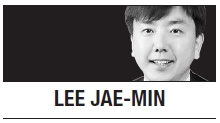Those outside Korea just wonder. As North Korea re-defines the meaning of brinkmanship each day by increasing its military threat against the South, what grabs the attention of the foreign media is the seemingly unusual calmness of the people in Seoul. In fact, no disruption or change to the pattern of life for Seoulites has been observed in the face of the harshest verbal threats that a country could imagine. Just visit the banks of the Hangang River in any given evening. You can see many people jogging, riding bicycles and having some nice family picnics.

Footage from foreign broadcasters and TV stations that have dispatched their conflict zone specialists to the peninsula, however, has delivered something quite different on screen: war plans are being diagrammed and evacuation schemes debated. In a special report by a foreign broadcasting company in the middle of April, a female correspondent introduced an evacuation shelter in Seoul.
What was noticeable on TV screen was the look of the indifferent Seoulites walking briskly by while the correspondent delivered an energetic report in a high-pitched tone. She seems to be the only person, at least at that time in that place, paying any attention to the evacuation shelter. Obviously there seems to be a noticeable discrepancy between what is being reported on foreign TV news and what people really feel here in Seoul.
Being cautious always helps. But the problem of this zealous coverage by foreign media is that to some extent it seems exactly what North Korea has wanted. Quite a few experts view the recent North Korean brinkmanship as a desperate effort to get the attention of the United States and other countries, and use that attention to force the South to make yet more concessions. The foreign media’s coverage under these circumstances, despite all its good intentions, risks being played by such a game plan. It is difficult to find a solid reason why foreign media should react more sensitively to the current situation than those who actually live here are.
Since South Korea has been under this environment for the past six decades experiencing all kinds of North Korean threats, one might say that the country has become anesthetized to the imminent threat. But knowing the consequences for their lives and properties, who could possibly be anesthetized to a real and imminent threat of this magnitude? If a military conflict were indeed imminent, the airports would have been packed by now with foreigners departing Korea. No such flight is taking place, and in fact incoming travelers and investment are still robust. The fact that many people calmly maintain their normal lives should speak volumes.
U.S. National Intelligence Director James Clapper’s recent testimony on Capitol Hill to the effect that the recent tensions in Korea are not as great as they were in certain periods of 1960s and 1970s is quite telling. His warning against being fooled by the “belligerent rhetoric” of the North succinctly explains the calm response of those in Seoul. Instead of snapshots of recent developments, perhaps the long chronological background should be taken into account.
South Korea and the United States have made it clear that they will do whatever it takes if North Korea ever oversteps the mark. The public opinion in the South shows no signs of wavering or fear-spreading, as North Korea has hoped. It will soon realize (or may have realized already) that its rhetoric and threats have failed to deliver. Under the circumstances, it is not wise for foreign media to assume the worst and report on that premise. Again, if anything, this would only further incentivize Pyongyang’s brinkmanship.
In universities students are busy studying for the mid-term exams. At 10 p.m. each evening, parents’ cars form a long queue in front of private education institutes in Seoul’s Gangnam area to pick up their high school children. Everything is quiet and normal, until you turn on satellite TV.
By Lee Jae-min
Lee Jae-min is a professor of law at the School of Law, Hanyang University, in Seoul. Formerly he practiced law as an associate attorney with Willkie Farr & Gallagher LLP. ― Ed.







![[Exclusive] Hyundai Mobis eyes closer ties with BYD](http://res.heraldm.com/phpwas/restmb_idxmake.php?idx=644&simg=/content/image/2024/11/25/20241125050044_0.jpg)
